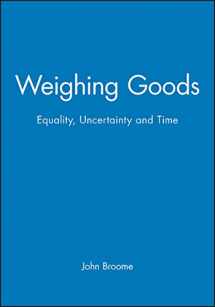
Weighing Goods: Equality, Uncertainty and Time (Economics and Philosophy)
ISBN-13:
9780631171997
ISBN-10:
0631171991
Edition:
0
Author:
John Broome
Publication date:
1991
Publisher:
Blackwell Pub
Format:
Hardcover
255 pages
FREE US shipping
Book details
ISBN-13:
9780631171997
ISBN-10:
0631171991
Edition:
0
Author:
John Broome
Publication date:
1991
Publisher:
Blackwell Pub
Format:
Hardcover
255 pages
Summary
Weighing Goods: Equality, Uncertainty and Time (Economics and Philosophy) (ISBN-13: 9780631171997 and ISBN-10: 0631171991), written by authors
John Broome, was published by Blackwell Pub in 1991.
With an overall rating of 3.7 stars, it's a notable title among other
books. You can easily purchase or rent Weighing Goods: Equality, Uncertainty and Time (Economics and Philosophy) (Hardcover) from BooksRun,
along with many other new and used
books
and textbooks.
And, if you're looking to sell your copy, our current buyback offer is $0.4.
Description
This work uses techniques from economics to illuminate fundamental questions in ethics, particularly in the foundations of utilitarianism. Topics considered include the nature of teleological ethics, the foundations of decision theory, the value of equality, and the moral significance of a person's continuing identity through time. The argument is unified around three theorums that connect together the way goods are distributed in three "dimensions": between people, across time within the life of a person, and across the states of nature under uncertainty. In each dimension analogous questions arise about the distribution of goods. Between people, what is the value of equality? Across time, can goods received at one time in a life fully compensate for deprivation at other times? Across states of nature, should we accept the independence axion of expected utility theory? The book treats all these questions as aspects of the general problem of weighing goods. It shows that, not only the three dimensions analogous, but there are strict logical connections between ethical judgements about the distribution of goods in all three. It connects judgements about equality, about risk, and about prudence. The theorems came from economics (although "Weighing Goods" contains no mathematics beyond elementary algebra), but they are set in a philosophical context and the conclusions are in ethics. In turn, the conclusions have important applications in economics.


We would LOVE it if you could help us and other readers by reviewing the book
Book review

Congratulations! We have received your book review.
{user}
{createdAt}
by {truncated_author}


